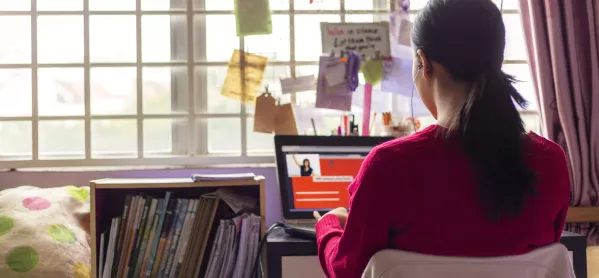What have the Covid lockdowns been like for student teachers? There have been undoubted pros and cons in the impact on initial teacher education (ITE).
Students always gain a lot from working collaboratively, but opportunities to collaborate have been severely impacted. This extends to the informal relationships and friendships that are usually built, and we know that, for some students, doing this at a distance has been much harder and has resulted in some mental health challenges.
Many have had to juggle their coursework with family responsibilities, from supporting children’s home learning to looking after elderly, disabled or unwell relatives.
There have been pressures around both physical space and broadband - not all homes are set up for quiet study or for multiple internet users at the same time, and access to the university library has been restricted.
Student teacher placement advice: What you need to know
Covid: Student teachers ‘have been through a traumatic event’
Background: Covid ends school placements for student teachers
Quick read: ‘Traditional profile of student teachers is changing’
Opinion: How Covid-19 has changed what it means to be an NQT
Donaldson report 10 years on: ‘Good progress’ but much to do
The disruption to children’s school attendance has had a knock-on effect on school placements, and had an impact on all students’ capacity to meet the Standard for Provisional Registration as securely as they might otherwise have done.
Understandably, the capacity for students to make connections between theory and practice have been more limited this year, given the reduction in face-to-face placement teaching. For some students this also has an impact on their confidence to engage in future placements.
There absolutely have been some positives to take from the experience, however. The capacity to exercise adaptability and flexibility has been immense, and these are important and often under-practiced skills for new teachers.
Student teachers have engaged with digital learning (their own and that of school pupils) in ways that we never would have imagined a year ago, opening new avenues for creativity and pupil engagement.
From their own experiences, students will have developed insight into the effects lockdown had on children and families. The pandemic has shone a light on children’s mental health and there has been greater emphasis put upon that in seminars which we will probably retain, moving forward.
A greater number of lectures have been recorded than in previous years. Students have commented positively on the opportunities this has given to revisit lecture content at a pace that suits them. Again, we will look at how we might retain the best of these practices.
We have also moved to purely online placement files, and this has not only had a positive impact on the environment, but has also made accessibility and communication between student, mentor and tutor much easier. And we have also built in new approaches to one-to-one coaching and mentoring on placement, and this has proven very valuable to our students, as well as allowing staff to identify and being to address difficulties much earlier in the process.
Although we have made changes to previous practice, student teachers are and will continue to be supported and assessed rigorously during ITE, while those taking the next step into their probation year are well prepared. They will continue their learning journeys in a similar way to students before them, but with a greater national awareness of the need for additional support for some.
There will be some student teachers who will require an extension to their student-teacher status and conditions, as documented in recently released national guidance. This group of students will be supported and assessed jointly by higher education institutions and school staff in the usual way. Thereafter, newly qualified teachers will be supported through the local authority probationer programmes. This national approach has been the result of extensive collaborative working between the universities in Scotland which provide ITE.
ITE in Scotland has had to adapt to a lot during Covid, btu we have learned from the experience and hope to emerge stronger than ever.
Professor Aileen Kennedy is director of teacher education at the University of Strathclyde
The latest issue of Tes Scotland magazine, out on Friday 19 March, is a special issue marking a year of Covid





